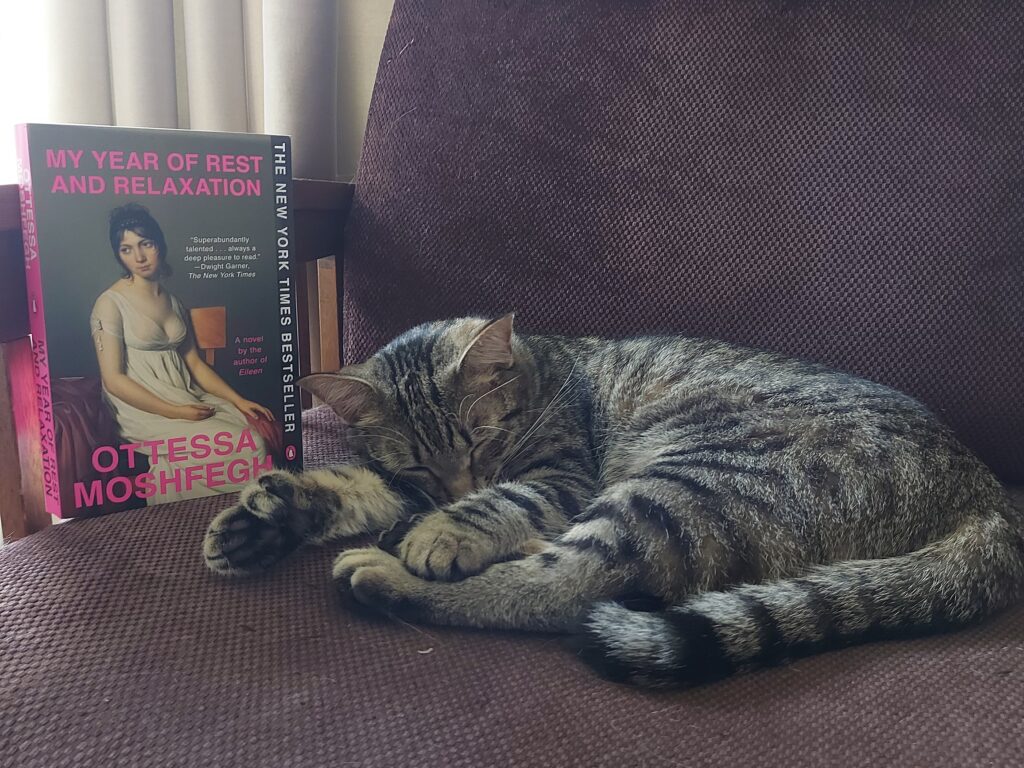My Year of Rest and Relaxation by Ottessa Moshfegh

My Year of Rest and Relaxation is one of the more bizarre novels I have ever read, but I liked it and found it to be darkly funny and compulsively readable.
The novel is about an unnamed narrator in her late twenties who, on the face of it, seems to have it all: she is thin and pretty, owns her apartment on the Upper East Side of Manhattan, and lives off an inheritance. But she, like most of us, is living with trauma that makes her feel like there is something wrong with life. She wants to reset her life and decides to go about doing it in one of the more questionable ways possible: she is going to sleep her way through an entire year of her life.
The narrator quits/gets fired from her job, arranges for automatic bill payments, and arranges for her laundry to be pick up once per week, then she starts sleeping. She wakes up long enough everyday to shuffle to the bodega around the corner from her apartment for two large coffees and some snacks and watches some old VHS movies (the year is 2000/2001; the spectre of 9/11 hangs over the novel) before falling back asleep again. And then she develops insomnia. This royally messes up her plans to sleep for a year so she starts randomly calling psychiatrists from the yellow pages one night until she hits the jackpot with seriously one of the worst psychiatrists you will ever read about. This psychiatrist does not listen very well, is only too happy to prescribe the narrator with all the drugs she asks for, and knows how to game the insurance system.
I can empathize with what the narrator is going through. I do not think I would like to sleep for an entire year of my life, regardless of how tired I am by the end of a work week, but sometimes I think it would be beneficial to disconnect from the world for a bit. However, this novel was giving me serious anxiety with all the different combinations of drugs the narrator was taking and the effect that these drugs were having on her. And it seems that even the narrator’s “unconscious” self did not like the idea of sleeping an entire year away.
Although I empathized with the narrator’s situation, she is not a particularly likeable character. Her recklessness towards her own health and safety is frustrating. She is unnecessarily cruel to her “best friend” Reva. Reva and the narrator seem to be frenemies rather than real friends, but Reva is literally the only person in the narrator’s life that seems to care, even if it is just a little bit, about the narrator. Reva herself is not the most likable character, but she has her own problems (she has low self esteem and suffers from bulimia, and her mother is dying), and the narrator lacks the ability to feel any empathy towards Reva until it is too late. Despite this, and her crazy plan to sleep for an entire year, I appreciate that the narrator is perhaps one of the most realistic characters I have ever seen depicted in a novel.
There is so much to unpack in this novel (including a subplot involving a “provocative” artist that the narrator becomes a muse for) but I mainly read it because I wanted to find out if the narrator would actually be successful in her year of “rest and relaxation” and what effect it would have on her in the end. I am not convinced that burying your head in the sand with the expectation that your problems will just go away actually works. The thing about life is that it is hard, and you must learn how to cope with the hard stuff in life if you want to get any enjoyment out of it.